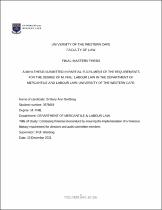| dc.description.abstract | Before the 1990s, corporate governance was a very rarely used term within the business world.1 Corporations over time have become more influential, larger and more complex within the global economy; therefore to ensure that they are operating on an economic and ethical basis, corporate governance has become more defined.2 Corporate governance can be defined as the procedures and methods that are used in order to ensure the functioning, direction and structure of a corporation.3 Not only can its key elements be described as procedures and methods but also a system of principles, policies, procedures, and clearly defined responsibilities and accountabilities. Corporate governance has roots in ethical behavior and business principles, with the goal of creating long-term value and sustainability for all stakeholders, thus including directors.4 This practice of good corporate governance by directors is used to promote equity and deters fraud and other deceptive practices. | en_US |

